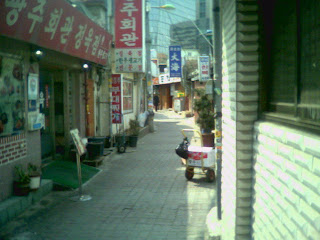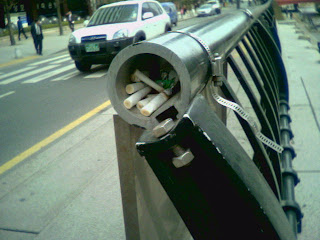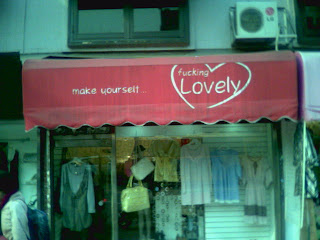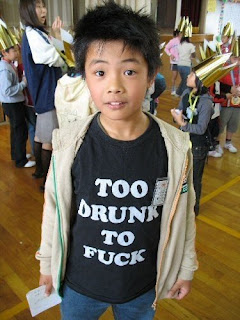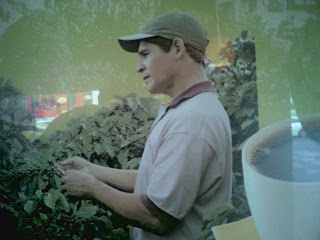Harry Connick Jr.: It Had To Be You
So a few months ago, I started seeing this poster, advertising a concert for "Harry Connick Jr." -- now, while I DO enjoy it, and even prefer it for swing dancing, jazz/pop/big band isn't usually my very, tippy-top FIRST choice of musical styles (that honour would have to go to singer/songwriter; thanks, Nick Drake, Tom Waits and Micah P. Hinson); however, from what I know of Girlfriendoseyo, and from what I know of Harry Connick Jr., I had a feeling they might like each other, and considering he built his reputation in New Orleans, the birthplace of Jazz and all, and held his own opposite Sandra Bullock in the movie Hope Floats, I also had a feeling he'd have the charisma to put on a tootin' good show.

So the next time I was with Girlfriendoseyo, and we saw a sign for old Harry's show, I pointed it out to her. "Hey. This is an artist I like; I bet we'd really enjoy seeing his show together." (Sure, I should have tried harder to get tickets to see Bjork, too, but I just dropped the ball on that one. Still waiting for Radiohead to show up here; I'd skip a day of work to see THEM play.)
One of the first dates I went on with girlfriendoseyo was to see one of her favourite Korean pop singers, Kim Geon Mo, a beloved singalong popstar with a goofy grin and a really charming way of working a crowd -- between songs he had the whole Sejong Art Centre in stitches. The joy of live music is such a wonderful thing -- being part of a crowd, enjoying the same performance somehow connects people, and I feel like masks drop.
The band Wolf Parade
 Even when I went to see Arcade Fire and Wolf Parade, two indie-ish bands whose fans pride themselves on "Knowing more about music than YOU do," in Vancouver, a city with underground hipster-pride to rival Portland, Seattle, or Greenwich Village, where people say stuff like "I liked The Saber-Toothed Misanthrope BEFORE she sold out and made a CD," and where I saw a girl walking around in a tizzy of self-consciousness, trying to justify her presence at an INDIE ROCK SHOW by pointing at her shirt and saying, "I've got cred! I'm wearing an ironic T-Shirt!"
Even when I went to see Arcade Fire and Wolf Parade, two indie-ish bands whose fans pride themselves on "Knowing more about music than YOU do," in Vancouver, a city with underground hipster-pride to rival Portland, Seattle, or Greenwich Village, where people say stuff like "I liked The Saber-Toothed Misanthrope BEFORE she sold out and made a CD," and where I saw a girl walking around in a tizzy of self-consciousness, trying to justify her presence at an INDIE ROCK SHOW by pointing at her shirt and saying, "I've got cred! I'm wearing an ironic T-Shirt!" Yes, even at THAT show, once the bands started flying, there were a few moments where all (well, most) of those music snobs dropped their cooler-than-thou guards and actually shared something.
Yes, even at THAT show, once the bands started flying, there were a few moments where all (well, most) of those music snobs dropped their cooler-than-thou guards and actually shared something. Eight months later, they might see each other in a record shop (vinyl, of course, NEVER *gasp* CD's), and realize, "Hey. I was at Arcade Fire and Wolf Parade, too." And instead of saying something viciously critical of the show, they might just let their guard drop, meet eyes, and say, "cool. Me too."
Eight months later, they might see each other in a record shop (vinyl, of course, NEVER *gasp* CD's), and realize, "Hey. I was at Arcade Fire and Wolf Parade, too." And instead of saying something viciously critical of the show, they might just let their guard drop, meet eyes, and say, "cool. Me too."Ironic t-shirts. For the emo in all of us.


At the Kim Geon Mo show, I saw something similar, some kind of communal joy, in Girlfriendoseyo's face as she sang along, off-key to the greatest hits and swayed her arms over her head, side to side for slow songs and forward and backward for fast songs (like everyone else in the crowd waving their goofy glow-sticks). It was charming, joyful, and sweet, even though I understand about 5% of the words being sung or spoken.
Kim Geon Mo's goofy smile.
 So hell, yeah. I wanted to see a live show with Girlfriendoseyo! After a hiccup during planning: I had a brainfart, and rescheduled my last class for the Thursday BEFORE the actual show, and then had to make up classes THAT day AND the actual day of the concert, we went to see Harry Connick Jr. at the Seoul Art Center.
So hell, yeah. I wanted to see a live show with Girlfriendoseyo! After a hiccup during planning: I had a brainfart, and rescheduled my last class for the Thursday BEFORE the actual show, and then had to make up classes THAT day AND the actual day of the concert, we went to see Harry Connick Jr. at the Seoul Art Center.The man did not disappoint. He showed up with a full big band, and family in tow; the drummer was cooking, in all the right ways, and gave even a slow marching piece a kind of rhythmic drive. The band was tight as a pop-star tank top, and old Harry varied the pace, switched from big to small arrangements, and alternated between voice and piano as he ran the show.
He brought his daughters on stage and they talked about how much they enjoyed wandering around the Namdaemun market, and he made a funny face and groaned, "I wish somebody'd told me it's BAD to eat TOO much Kimchi." (Next time, if he and his family needs a guide around downtown Seoul, I'm in. Just get in touch with me on the comment board, Mr. C!) He said Korean women are beautiful, thanked the crowd for its warm welcome, riffed on how much he enjoys the Korean phrase for "thank you" (Kamsa'amnida), and by the time he sang a few lines from the Korean folk-song Arirang (which I've talked about here before), he had everyone in the palm of his hand.
His song selection was a tribute to his hometown, songs about New Orleans, written by New Orleaners, or (in one case) played in the New Orleans Jazz style. The sweetness and warmth of the man singing about his beleaguered hometown (sorry 'bout Katrina, eh?) was touching, and that emotion (in Korean it's called Han -- the melancholy wishing for a home to which we can never truly return) is one that's deeply embedded in Korean traditional art, so it's no surprise he connected with the crowd.
Between his daughters sailing across the stage on wheelies (shoes with wheels in the bottom) and cheering, "Go Korea!", and one of Harry's old buddies, who came out and wowed everyone with a trombone solo, and joked around with him on-stage for the rest of the show, even when he wasn't playing, the whole show had a feeling of a happy dude hanging out with his good friends, and when he danced as the big band carried the groove, he kept the crowd either swaying or laughing (the butt-shaking dance was goofy, but totally hilarious). By the climax of the show, and the encores, people were spontaneously standing up and dancing or swaying to the music, which is pretty surprising in Korea, where crowds are generally quite shy, even for local acts, and his ovation was wild. Harry himself was overwhelmed by the size of the crowd (he packed the place out, which he hadn't done at other venues on the Asian leg of his tour), and he was overwhelmed again when, by show of hands, the crowd revealed itself to be predominantly Korean (unlike in China, where most of the audience were North American expats, revealing that his local fan-base in China was still small).
(his daughters wore shoes like this)

Yes We Can Can - he sang this one at the show.
Girlfriendoseyo was beaming all through the last third of the show, and she was definitely charmed by Connick's fine, funny showmanship. It was great for me, too -- some musical styles are better on CD than live (things like mellow house, DIY indie rock (do it yourself can sometimes be pretty rough live), math rock or certain kinds of electronica where the layers and textures are the main point of the music, arguably classical) most musical styles are better live than in recording (rock, pop, songwriter stuff, arguably classical) by a reasonable margin, but big band and jazz in general is certainly right up there with the blues as musical styles where the live experience FAR FAR outstrips the recording -- enough so that I might even be inclined to argue you're wasting your time buying the CD. Girlfriendoseyo's been having a hella tough month with a handful of different kinds of stress flying at her all at once, but the show really got her mind off all the yucky stuff for an evening, and she told me she was so excited about Connick's performance that back at home, she put on one of the jazz CDs I gave her and danced around her apartment to it, imitating Junior's stylings.
That made me grin: she's almost ready for me to take her swing dancing!
So anyway, thanks a lot, Harry Connick Jr., for putting on a fantastic show, for giving your best and making my and my girlfriend's week; you made a new fan, and secured another one for life.
Here's Kim Geon Mo, the singer girlfriendoseyo really likes. . . the English version, no less!
Plus, lots of examples of his cute, goofy smile. He puts on a really good show, live.
From the website Japan Probe:
 There's a Ninja Festival in Mie Japan; your approaching death has never looked so cute.
There's a Ninja Festival in Mie Japan; your approaching death has never looked so cute.And finally: survey of the day!
which bands would YOU skip a day of work to see live, and screw the consequences?
I'm gonna go with. . .
Radiohead
Modest Mouse
White Stripes
and Tom Waits. . . and that's about it.
And for Tom Waits, I'd probably even fly to Shanghai, if I had to.
I'd skip half a day to see U2, or reschedule all my classes, 'cos I've heard they put on a great live show, but I don't think I could bring myself to skip a full day for them, with all due respect. Ditto for Micah P. Hinson, Elvis, and Jimi Hendrix.








